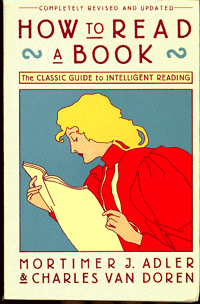As one committed to historic Christianity I believe in the verbal inspiration of Scripture – that God so moved the writers that what was written was precisely what he wanted written. But I also believe that what was written, being written by human beings in human language, is to be approached and read in most respects as we would approach and read any other book. We need not apply any special code or method (and we certainly don’t need bibles edited for every possible demographic, but that’s for another post).
Years ago, I read what I thought to be a curiously titled book, Mortimer Adler’s How to Read a Book. The premise of the book was that though most of us can ‘read’ words on a page, few of us have developed the ability to read for understanding. I found to be extremely helpful on a number of levels.

It struck me as I read it that if any of us were to apply his insights to the simple reading of the Bible we would come away with a good bit more understanding and, perhaps more importantly, far less mis-understanding.
I get giddy when really smart people agree with me. How to Read the Bible for All It’s Worth is an excellent little book on understanding the Bible written by Douglas Stuart and Gordon Fee. They ask, “How do we learn to do good exegesis? (“Exegesis” is a fancy word for the process of understanding the Bible.) Their answer, among other insights, includes this:
“The key to good exegesis, and therefore to a more intelligent reading of the Bible, is to learn to read the text carefully and to ask the right questions of the text. One of the best things one could do in this regard would be to read Mortimer J. Adler’s How to Read a Book (1940, rev. ed. With Charles Van Doren, New York: Simon and Schuster, 1972). Our experience over many years in college and seminary teaching is that many people simply do not know how to read well. To read or study the Bible intelligently demands careful reading, and that includes learning to ask the right questions of the text.”
I still get giddy when I read that. But I’m weird that way.

P. Holt
Randy, have you read How To Read Slowly by James Sire? Another excellent effort to teach reading comprehension of various genres.
Randy Greenwald
I own it. Does that count?! I have skimmed it which, ironically, is the opposite of slowly.